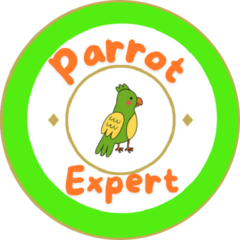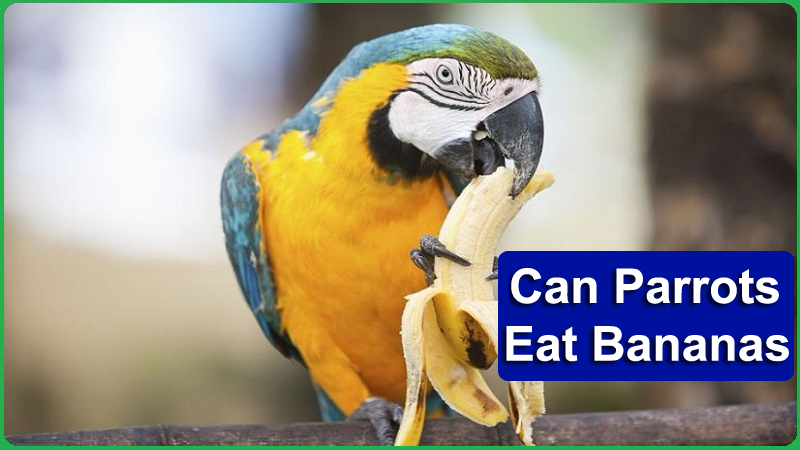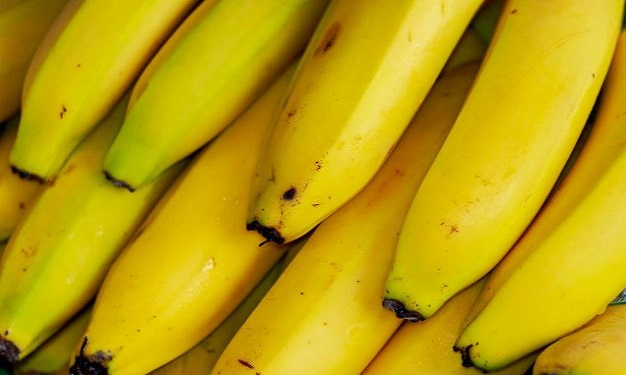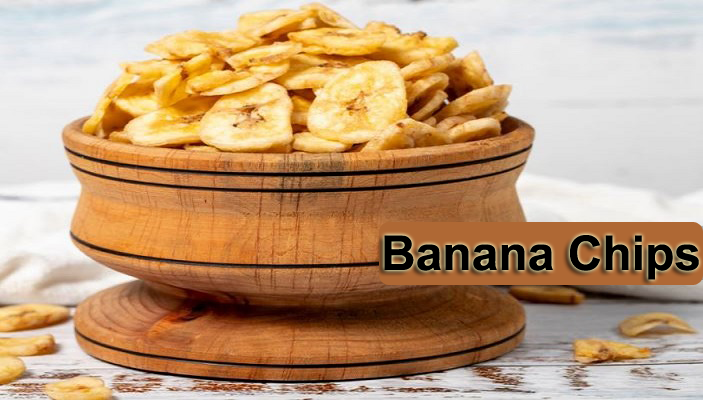As you know, that monkeys too like to eat banana. Now, you are thinking about do parrots fondly like to eat a banana as well? Can they are safe fruit to parrots in any way? Otherwise can parrots eat bananas properly without from any negative concern.
These are good questions about your parrots for bananas. In short, ‘Yes’! Parrots can eat bananas. This answer should be known every parrot’s owners, before making diet for their parrots. Firstly, you should know that bananas are not poisonous to your parrots. Parrots prefer to eat a banana as fondly as they eat any other fruit.
While you offer parrots any fruit with being pits or seeds, be careful and caution we exercise. But, bananas have not any these problems. It employs vitamin A, B-6, C, iron, and magnesium that is helpful for their health. In this post, we will cover all possible stuffs about feeding your parrots for bananas. Keep reading!
Do Parrots Like to Eat Bananas?
Yes! Parrots prefer to eat bananas. So, bananas can be safe and nutritious treat for your parrots. Bananas enable essential nutrients, including vitamin (A and B6), and magnesium, which are beneficial for their healthy life.
Parrots can have the peel of banana, but recommended to eliminate it to prevent potential exposure to pesticides. Cooked bananas should be given in moderation due to added sugars. So, you can allow the raw, peeled bananas.
It is the best way to feed them to parrots. Overall, you can say that bananas are important for healthy snack for your loving parrots.
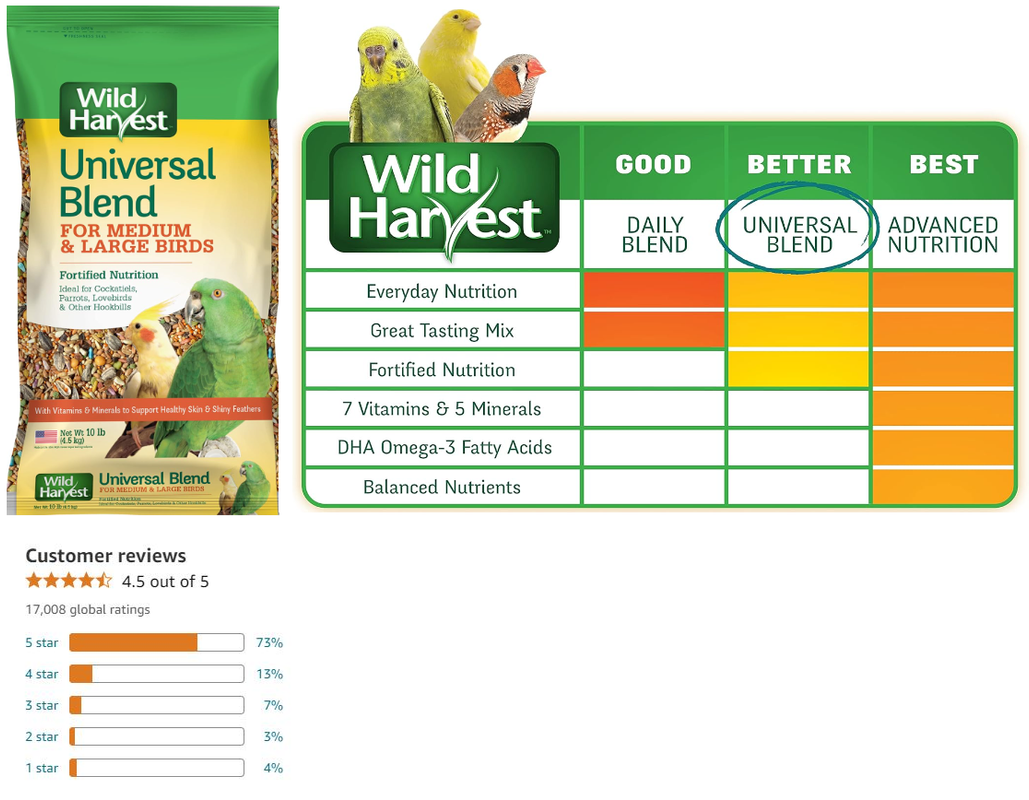
Benefits of Bananas to Parrots
Bananas offer several benefits to parrots; if you allow them in moderation in parrot’s diet:
Nutritional Benefits
Bananas contain several essential vitamins and minerals, including vitamin A, B6, C, potassium, magnesium, and antioxidants.
These nutrients are getting to support eye health, immune system, metabolism, and cardiovascular function.
Digestive Health
Bananas contain fiber that helps improve the digestibility of other dietary components. They also help to enhance the movement of the digestive tract in parrots.
The fiber in bananas can also help prevent constipation, and maintain gut health.
Energy and Weight Management
Bananas provide a balanced, sustainable source of energy for parrots. They consist the resistant starch content that doesn’t spike blood sugar levels.
When fed in moderation, bananas can be a healthy treat that contribute to over-weight gain in parrots.
Palatability and Foraging
Generally, parrots enjoy the taste and texture of bananas, and making them a popular and appealing treat.
Offering peeled bananas can also encourage foraging behavior in parrots. So, it is important for their mental stimulation and natural instincts.
Nutritional Information of Bananas for Parrots
Here, we will show you nutritional information of bananas for your parrots. It includes essential nutrients that contribute to their overall health and well-being.
Also Read: Can Parrots Eat Grapes with {Seed and Peeps}? Yes or Not
| Nutrient | Amount Per 100g |
|---|---|
| Calories | 89 kcal |
| Protein | 1.1 g |
| Fat | < 0.3 g |
| Carbohydrates | 23 g |
| Sugars | 12 g |
| Dietary Fiber | 2.6 g |
| Vitamin C | 8.7 mg |
| Vitamin B6 | 0.367 mg |
| Vitamin A | Trace amounts |
| Potassium | 358 mg |
| Magnesium | 27 mg |
| Phosphorus | 22 mg |
| Calcium | 5 mg |
| Water Content | 74-76% |
Vitamins
Bananas have various vitamin A, B6, and C that are crucial for parrots’ health. Vitamin A supports eye and reproductive health. But, vitamin B6 aids in digestion and nutrient absorption. Vitamin C in bananas acts as an immune system booster that aids in iron absorption, promotes wound healing, and reduces inflammation.
Minerals
Bananas contain many essential minerals like potassium and magnesium. Magnesium is most supportive for bone and brain growth, but potassium gives to support various bodily functions.
Fiber
Bananas are a excellent option of fiber, with 3 grams per 100 grams. The soluble fiber slows down digestion, increasing satiety, while insoluble fiber bulks up stool, aiding in digestion.
Resistant Starch
Unripe bananas contain resistant starch that doesn’t spike blood sugar levels. So, it also serve the balanced and boost-up energy for parrots.
Bad Things of Bananas to Parrots
There are some potential drawbacks or considerations about bananas for your parrots, so keep in mind:
Also Read: Can Parrots Eat Strawberries? Should Be Known
High Sugar Content
Often, bananas have natural sugars in large amount, primarily fructose and glucose. We accept, these sugars offer quick energy; but they consume them excessive, then can gain weight. As well as, it also potentially leads to health problems such as obesity or diabetes.
Potential for Gastrointestinal Upset
Some parrots may be get sensitive to bananas that could cause gastrointestinal upset such as diarrhoea. If, you introduce bananas gradually into your parrot’s diet, then monitor their tolerance.
Nutritional Imbalance if Over-consumed
If a parrot fed bananas in large amount without a balanced diet of other foods. Then, it may pose to a nutritional imbalance. So, you should offer bananas with varied diet, like as a mix of fruits, vegetables, nuts, and seeds.
Interference with Calcium Absorption
Bananas employ the oxalic acid in large quantities, so it may interfere with calcium absorption in the body. Parrots need the adequate calcium for bone health and egg production. Hence, bananas are not a essential source of oxalic acid, but may still be a concern, especially if the parrot’s diet has not calcium-rich foods.
Potential for Allergic Reactions
As similar other foods, bananas can potentially cause allergic reactions in some parrots. These signs of an allergic reaction like as itching, swelling, or respiratory distress. If you see any adverse reactions after feeding bananas to your parrot, then quickly stop their use, and get consult a veterinarian.
Pesticide Residues
Non-organic bananas may employ pesticide residues that could pose a risk to your parrot’s health if ingested. So, you always should choose organic bananas, or thoroughly wash conventionally grown bananas before feeding them to your parrot.
Potential for Obesity
Keeping mind, bananas themselves are not able to inherently fattening. If your parrots get over-feeding any high-calorie food, including bananas, then it can get to obesity in them. Bird’s obesity can create various health issues, like as joint problems, respiratory difficulties, and a shortened lifespan.
How Much Banana I Can Allow to Parrot?
Parrots prefer to bananas, but it should be in moderation. The recommended amount is:
Don’t give more than 1 small banana per day. The quantities can very depend on the size of the parrots.
Cut banana about 1/4 inch square, and only 1 or 2 pieces per day, but only occasionally
Don’t make up large portion of bananas for the parrot’s diet. You can offer it as a treat or snack, but not as a main part of the diet.
Is Banana Peels Safe for Parrots?
Banana peels are not toxic to your parrots, but you should not recommend offering them to parrots due to potential pesticide exposure. Most of bananas are available, after getting spray with pesticides and other toxins. These can be harmful if ingested by parrots.
Also Read: Can Parrots Eat Carrots? (Yes or Not} Feeding Guide
When you scrub the peel to clean it, then can break it down and potentially expose the parrot to these harmful substances. Until, you are certain about the source and cultivation methods of the bananas. It is best way to remove and discard the peel before feeding bananas to your parrot.
Can I Give Banana Chips and Banana Bread to My Parrots?
You can offer banana chips and banana bread to parrots as an occasional treat. Keeping mind that doesn’t make it a regular part of parrot’s diet.
Before feeding banana chips, you make sure they are unsweetened and do not contain any added salt. These harmful additives are not suitable for your parrots. Moreover, generally banana chips have often dehydration. Hence, they may be high in sugar and fat. So, you should offer them sparingly.
Banana bread can also be fed in small quantities as an occasional treat. However, keep away of any additional ingredients from banana bread recipe, such as sugar, butter, or other flavorings, because they are not be suitable for parrots. Ideally, you should opt for a simple banana bread recipe with minimal added ingredients.
Guidelines to Feed Bananas for Parrots
To feed bananas to parrots, consider the following guidelines:
Also Read: Can Parrots Eat Tomatoes? Complete Feeding Guide
Raw Bananas: Raw bananas are excellent option for your parrots. They are fully packed with nutrients, and easy to digest. Cooking bananas can remove essential nutrients, so recommending them raw.
Freshness: You always offer the fresh bananas to your parrots, because long time storage can eliminate their nutritional benefits.
Moderation: Should be fed bananas in moderation. We know about they are a nutritious treat, but containing high in sugar and starch. So, you don’t make them a large part of a parrot’s daily diet.
Peel: You never recommending banana peels for parrots, until you know the bananas were grown organically and without pesticides. They can be harmful if ingested.
Variety: Parrots enjoy bananas in different forms, such as sliced, diced, or mashed. This variety can help keep their diet interesting and prevent boredom.
Banana Chips and Banana Bread: Banana chips and banana bread are not recommended for parrots. They often consist added sugars that are not suitable for parrots.
Cooked Bananas: You can recommend cooked bananas for parrots only when they are sick and unable to eat raw bananas. This is because cooking bananas can remove essential nutrients.
Green Bananas: Green bananas are also known as plantains. They are a good option for parrots. They are high in starch and lower in sugar that making them a nutritious choice.
Summing Up
As result of this article, you have known about bananas that they are good food for adding in parrot’s diet. Now, we hope that you took all answers of your questions relating to parrots for bananas.
Also Read: Can Parrots Eat Watermelon (Seed + Rind)? Feeding Guide
If this content is delight for you, then please share it along with your friends, family members, pet lovers or relatives over social media platforms like as Facebook, Instagram, Linked In, Twitter, and more.
Do you have any experience, tips, tricks, or query regarding on this? You can drop a comment!
Have a Nice Day!!
